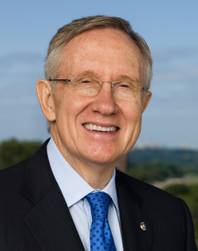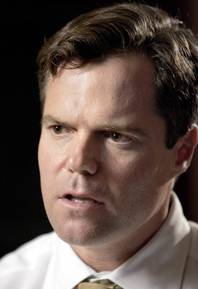Wednesday, Sept. 29, 2010 | 2:01 a.m.

Harry Reid

Sharron Angle
Angle opposes insurance mandates
Sun coverage
Sun archives
- Harry Reid inching ahead of Sharron Angle, new poll finds (9-25-2010)
- Harry Reid ladling the attack on Sharron Angle in Senate race (9-16-2010)
- Sharron Angle, Harry Reid have yet to pursue the undecided (9-12-2010)
- Over half disdain him, but Harry Reid could still win Senate race (9-5-2010)
- Harry Reid, Sharron Angle opposites on economic philosophies (8-22-2010)
- ‘None of the above’ vote could be deciding factor in Senate race (7-28-2010)
- Harry Reid, governor trade jabs over loss of education funding (7-28-2010)
- Sharron Angle addresses media for 3 minutes on taxes then bolts (7-22-2010)
- Jobless numbers wielded in attacks on Harry Reid (7-20-2010)
- Sharron Angle: Campaign to defeat Harry Reid ‘a calling’ (7-14-2010)
- Harry Reid slams Sharron Angle in new ad on CityCenter (7-14-10)
- Polls: Harry Reid grabs lead over Sharron Angle (7-16-10)
- How experts see route to victory for Harry Reid: Complicated (6-20-2010)
Republican Senate candidate Sharron Angle was roundly criticized when a recording surfaced last week of her talking candidly about her strategy of using appearances on conservative media outlets to raise money.
However, it’s not just in interviews with like-minded media that Angle slips in the line that has helped net her more than $3 million since the primary: “Harry Reid needs $25 million. I need a million people to send $25 to SharronAngle.com.”
In the recording, first reported by Sun columnist Jon Ralston, Angle brags about her haul from interviews with conservative talkers such as Rush Limbaugh and Sean Hannity. “When I said it (the line) on Sean Hannity’s television show, we made $40,000 before we even got out of the studio in New York. It was just (great).”
The admission prompted a flurry of news releases from Senate Majority Leader Harry Reid’s campaign, accusing Angle of viewing “the media as her personal ATM.”
Although it was Angle’s media strategy that was being dissected in this instance, the episode also revealed Reid’s strategy of aggressively using the press in a different way to further his campaign.
It’s not a new tactic for campaigns to try to harness for their purposes the unwieldy beast that is the American media, but Nevada’s U.S. Senate candidates have taken it to new heights in different ways.
Angle uses the interviews she grants — and those granted to mainstream media outlets have been few and far between this campaign — to raise money. Reid, on the other hand, has used his formidable campaign war chest to build an unprecedented communications staff who work relentlessly to steer the narrative of the campaign.
Reid’s campaign staff pitch, leak, cajole and finagle stories into mainstream newspapers and television broadcasts that match what they’ve designated as the message of the week. Then they respond in rapid-fire fashion when Angle launches an attack.
“Sen. Reid has arguably the best communications program that I’ve ever seen on a campaign,” Republican consultant Ryan Erwin said. “Without hesitation he has the most aggressive team. They are ruthless and tough and on the ball and fast and smart. And most of those are compliments.”
Take the recent controversy over Angle’s criticism of mandates for the treatment of autism in a months-old video released by Democrats.
Within hours of that story breaking, the Reid campaign had issued two news releases. That number grew to six in the following days. Those releases and other efforts by the campaign stoked a growing chorus of criticism from autism advocates in Nevada and across the nation.
The Reid campaign also borrows the credibility of longtime Nevada journalists to back up many of its attacks against Angle, using footage from newscasts in paid television ads.
But Reid’s need for an aggressive earned media strategy goes deeper than the traditional campaign.
“When you’re in trouble, which he is, you need to use every resource you’ve got,” said Kathleen Hall Jamieson, a political communications expert at the Annenberg School for Communication at the University of Pennsylvania. “It’s not so much, what’s the advantage of (a strong communications team), it’s you have to play every card you’ve got. And on the margin, the media matters.”
With a negative rating from voters in the mid-50s, Reid also has a credibility problem that he needs to neutralize.
“The problem is if you are unpopular as he is, it’s hard to put Reid out there as the messenger,” Jamieson said.
Almost a year ago, Reid went on air with positive biographical ads in an effort to flip his unfavorable rating. It didn’t work.
“He couldn’t move his numbers because he wasn’t a credible messenger about himself,” Erwin said. “Whether it’s using the media, or the Jim Murrens of the world, he’s using third parties to validate him because voters don’t believe he’s a credible messenger for himself.”
(MGM Resorts International CEO Jim Murren is a longtime supporter of Reid’s and has been used in his television ads.)

Jim Murren
The Reid campaign wouldn’t disclose how many paid staff members it has dedicated to communications. Nor does he detail job descriptions or titles on campaign finance reports.
But at least four staff members are responsible for sending out news releases and arranging interviews.
The staff also aggressively use Twitter, Facebook, blogs and other social media to get their message out.
The campaign denies its strategy is to find a more credible messenger than Reid.
“The main thing for us on the earned media strategy is getting as much information about (Angle) out as quickly as we can for voters using every platform they use to get their news,” spokesman Jon Summers said.
Analysts said Angle’s strategy of using the media for fundraising is a smart one. As the opponent of the Democratic Senate majority leader, Angle is able to tap into a well of discontent across the country to help pay for her campaign.
“There’s not enough money in Nevada for her to win,” Erwin said.
Angle has made the use of media interviews to raise money an art form.
Jamieson, who has spent decades analyzing political communication, said it’s unusual for a candidate to be as explicit as Angle is in asking for money, but not unheard of. George McGovern, a presidential candidate in 1972, relied on lengthy commercials to raise money.
“It isn’t a common strategy, nor does the news usually let you get away with it,” she said.
Countering the perception that Angle only talks to conservative media outlets, Angle spokesman Jarrod Agen said that in recent weeks she has spoken to The Washington Post, The New York Times, The Wall Street Journal, USA Today, CNN, ABC News, NBC News and local reporters.
“We do interviews to reach voters,” he said in an e-mail. “The more voters hear Sharron’s message, the more they want to support her. People all over the country have waited for this chance to defeat Harry Reid and they want to know how they can help Sharron.”
Angle isn’t the only one using the strategy. Tea Party candidates seeking to capitalize on anti-incumbent furor across the country are also nationalizing their races. Joe Miller in Alaska and Christine O’Donnell in Delaware are working national fundraising strategies.
Jamieson noted that Angle runs the danger of also raising money for Reid when she issues a pitch during a mainstream media interview that could reach Reid supporters.
“The danger is you activate the other side,” she said. “Viewers might see Harry Reid is in trouble, she’s not qualified and respond by sending Reid a check.”
Jamieson noted Republican vice presidential candidate Sarah Palin had that effect on Obama supporters during the 2008 presidential race.
But Erwin said this race is different. Voters outside Nevada can’t vote for president or against those in charge of Congress this year. But they can send Angle money, he said.


Join the Discussion:
Check this out for a full explanation of our conversion to the LiveFyre commenting system and instructions on how to sign up for an account.
Full comments policy